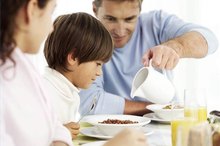Is Lightheadedness a Symptom of Food Poisoning?
Food poisoning is caused by eating food contaminated with bacteria, parasites or viruses 1. Food can become contaminated during processing or production or as a result of improper handling or cooking. Food poisoning most commonly occurs after you eat food from a restaurant, cafeteria, picnic or other social gathering where food is served 1. Most people recover from food poisoning without treatment, but complications can arise with some forms of food poisoning 1.
If you are experiencing serious medical symptoms, seek emergency treatment immediately.
Causes
You can get food poisoning from eating food prepared by someone who failed to wash his hands before handling the food or who used cooking utensils that were not clean 1. You can get food poisoning from eating foods containing mayonnaise that have been left unrefrigerated too long, or by eating refrigerated foods that were not stored at the proper temperature or reheated properly 1. Eating raw fish, undercooked eggs or meats, and raw fruits or vegetables that have not been properly washed puts you at a risk for food poisoning 1.
Common Symptoms
What Are the Effects of Food Contamination?
Learn More
Lightheadedness is a symptom of dehydration caused by a severe case of food poisoning that requires immediate medical attention 1. Symptoms could start hours after eating contaminated food or days or possibly even weeks later.
Severe Symptoms
More severe symptoms that require immediate medical attention include vomiting blood, frequent vomiting episodes that prevent you from keeping down liquids, severe diarrhea, blood in your stool, a temperature higher than 101.5 degrees F or muscle weaknesses that worsens. Dehydration symptoms such as excessive thirst, decreased urination, weakness, dry mouth, dizziness, double vision or difficulty speaking also require medical attention.
Diagnosis and Treatment
Signs & Symptoms of Food Poisoning From Mayonnaise
Learn More
Your doctor will examine you to check for physical signs of food poisoning 1. He will ask what foods you ate and conduct tests on your stools, blood, vomit or the food eaten. If you are experiencing diarrhea, he may advise you to avoid solid foods until it subsides, as well as diary products, which can make it worse. He will instruct you to drink plenty of fluids to replace fluids lost from vomiting or diarrhea. Fluids may be administered intravenously if you are unable to keep fluids down. Antibiotics are not usually prescribed for common causes of food poisoning, but over-the-counter medication may be taken with your doctor's okay 1. Treatment for food poisoning from shellfish or mushrooms involves emptying your stomach 1.
Prognosis and Complications
Recovery from food poisoning occurs anywhere from 24 hours to a few days, depending on the severity 1. Dehydration is the most serious complication of food poisoning 1. Other serious complications arise from listeria, which affects unborn infants and can cause miscarriage, premature birth, stillbirth or a potentially-fatal infection after birth. Some E. coli bacteria cause a condition known as hemolytic uremic syndrome, which can lead to kidney failure.
Related Articles
References
- MedlinePlus; Food Poisoning; Jan. 10, 2011
- Centers for Disease Control and Prevention. (2019). Foodborne Illnesses and Germs.
- Cdc.gov. x. Burden of Foodborne Illness: Findings | Estimates of Foodborne Illness | CDC. Published 2018
- Cdc.gov.. Burden of Foodborne Illness: Findings | Estimates of Foodborne Illness | CDC. Published April 2019.
- Papaconstantinou HT, Thomas JS. Bacterial colitis. Clin Colon Rectal Surg. 2007;20(1):18–27. doi:10.1055/s-2007-970196
- Sobel J. Botulism. Clin Infect Dis. 2005;41(8):1167-73. doi:10.1086/444507
- Food Poisoning Symptoms. Centers for Disease Control and Prevention. Published October 11, 2019.
- Bintsis T. Foodborne pathogens. AIMS Microbiol. 2017;3(3):529–563. Published 2017 Jun 29. doi:10.3934/microbiol.2017.3.529
- Chris A. Norwalk-like viruses: when the runs can slow you down [published correction appears in CMAJ. 2003 Feb 18;168(4):400]. CMAJ. 2003;168(1):64–65. PMID: 12515788
- Pinchuk IV, Beswick EJ, Reyes VE. Staphylococcal enterotoxins. Toxins (Basel). 2010;2(8):2177–2197. doi:10.3390/toxins2082177
- Humphries RM, Linscott AJ. Laboratory diagnosis of bacterial gastroenteritis. Clin Microbiol Rev. 2015;28(1):3–31. doi:10.1128/CMR.00073-14
- Dekker JP, Frank KM. Salmonella, Shigella, and yersinia. Clin Lab Med. 2015;35(2):225–246. doi:10.1016/j.cll.2015.02.002
- Arendt S, Rajagopal L, Strohbehn C, Stokes N, Meyer J, Mandernach S. Reporting of foodborne illness by U.S. consumers and healthcare professionals. Int J Environ Res Public Health. 2013;10(8):3684–3714. Published 2013 Aug 19. doi:10.3390/ijerph10083684
- FDA. Are You Storing Food Safely? U.S. Food and Drug Administration. Published June 4, 2016.
- Public Affairs. Recalls and Outbreaks. FoodSafety.gov. Published November 21, 2019.
- Lund BM. Microbiological Food Safety for Vulnerable People. Int J Environ Res Public Health. 2015;12(8):10117–10132. Published 2015 Aug 21. doi:10.3390/ijerph120810117
- Smith JK, Burns S, Cunningham S, Freeman J, McLellan A, McWilliam K. The hazards of honey: infantile botulism. BMJ Case Rep. 2010;2010:bcr0520103038. Published 2010 Sep 29. doi:10.1136/bcr.05.2010.3038
- Krugman's Infectious Diseases of Children, 11th edition. Philadelphia, PA: 2004.
Writer Bio
Connie Peete is a writer specializing in personal finance and health topics. She holds an associate's degree in secretarial science and information processing from the Bryant & Stratton Business Institute.









